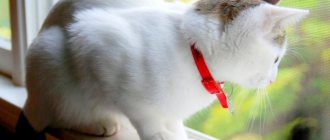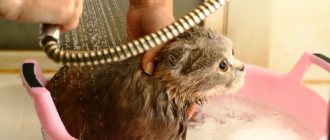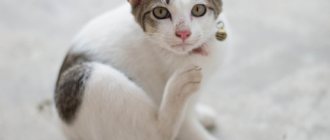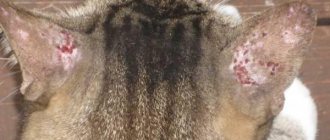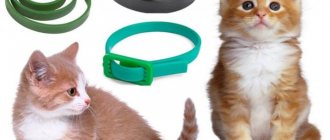Removing cat fleas from a pregnant animal has some specificity. The flea or Siphonaptera is a blood-sucking, secondarily wingless insect, characterized by complete transformation and the presence of a highly specialized oral apparatus with the help of which the ectoparasite pierces the skin of the host and sucks blood. Removing cat fleas from a pregnant animal at home is a rather labor-intensive process.
Harm caused and symptoms
It is quite difficult not to notice the presence of these insects in a cat, cat or kitten. Based on the characteristic symptoms, you can guess that fleas have settled on the animal. The pet's behavior changes dramatically: the animal exhibits restless behavior, as bites provoke scratching and scratching. The formation of dermatous changes and small focal baldness of skin areas may be observed.
Unlike a cat, a pregnant cat and kitten experience much more discomfort, and the itching from the bite of just one adult individual of this ectoparasite lasts for several days. The animal is not able to get rid of fleas on its own, so the main task of the owner is the need to remove these insects as quickly as possible.
Removing cat fleas from a pregnant animal at home is a rather labor-intensive process.
Drops from Russian manufacturers
From the entire arsenal of anti-flea drops produced by domestic manufacturers, we can recommend Inspector (from the Ecoprom company) and Biovax for pregnant cats.
The inspector contains two active ingredients - fipronil (10%) and moxidetin (1%). Fipronil is quickly distributed over the surface of the body, having a paralytic effect on ectoparasites, and is practically not absorbed through the skin. Moxidetin, on the contrary, penetrates the blood and is distributed in internal tissues and organs, destroying nematodes and external pests. After treatment, the animal cannot be bathed or washed for 5 days. The anti-flea effect lasts for one and a half months.
Biovax contains exclusively natural components that do not have a toxic effect on the animal’s body in general and pregnancy in particular. The drug has an insecticidal and repellent effect, but less pronounced than its synthetic analogues. Destroys fleas and ticks and repels horseflies, flies, and mosquitoes. After application, the death of ectoparasites occurs within 24 hours, and the animal continues to be protected for a month. The advantages of Biovax drops include their antifungal and antiseptic effect, a positive effect on the condition of the fur, and the elimination of itching and skin irritation. Before applying the drug, it is recommended to conduct a test to determine its tolerance to animals. It is enough to apply 3-4 drops to the withers and observe the cat’s reaction for half an hour. If there are no side effects, use the rest of the product.
Treatment methods
In order to remove fleas from a healthy adult animal at home, you can use almost any drug designed to destroy ectoparasites of this species. The veterinary industry offers a variety of sprays, drops, shampoos, anti-flea collars and other products that help get rid of such an unpleasant neighborhood in a short time.
It is more difficult to carry out such an event if fleas attacked an ill or weakened animal, a pregnant cat or a small kitten. Treating the fur of such animals with standard anti-flea products is quite dangerous.
Most modern drugs and remedies have some side effects and can provoke an undesirable reaction in the vulnerable body of a pet.
Kittens have a rather weak immune system and are much more susceptible to all symptoms of the disease.
Why do fleas need to be removed?
External parasites are more than just a nuisance for your pet. Cat fleas pose a real threat to animal health:
- carry worm eggs;
- contribute to the infection of animals with viral, bacterial and fungal infections;
- lead to allergic dermatitis;
- promote hair loss, baldness;
- lead to infection and inflammation of the affected areas;
- cause anxiety to the animal and increase nervousness;
- cause anemia and emaciation in newborn kittens.
Having discovered parasites in a pet, the owner must immediately take measures to destroy them.
Treatment of pregnant cats
To remove fleas from a pregnant or lactating cat, you should choose an effective, most gentle drug. Ridding a pregnant cat of blood-sucking parasites before the kittens are born is the primary task of every owner. Newborn kittens are absolutely defenseless against fleas, which not only cause severe itching, but also infect the fragile body with worms. Infected babies are severely stunted and grow very weak and restless.
During pregnancy or breastfeeding, anti-flea treatment is based on preventing the ingestion of even a minimal amount of the drug. Harmless to an adult and healthy animal, the anti-flea agent can negatively affect pregnancy and provoke spontaneous miscarriage or abnormal development of the fetus. It is for this reason that it is advisable to use the following low-toxic products:
- flea collar
- flea shampoo
- after consulting a veterinarian - special drops for fleas
To remove fleas from a pregnant or lactating cat, you should choose an effective, most gentle drug.
The first two drugs do not affect the intrauterine development of kittens. Some types of anti-flea drops can penetrate not only under the skin, but also into the circulatory system. A pregnant cat can only be treated with such drugs with the permission of a veterinarian.
The use of shampoos in such conditions sometimes causes stress in the pregnant animal and is therefore used in cases of extreme necessity. Therefore, experts most often recommend putting a collar on a pregnant pet, which should be chosen according to certain rules.
Safety of disposal
It is imperative to treat an infected cat when she is pregnant. Constant bites and discomfort experienced by the animal can lead to nervous exhaustion.
In addition, being carriers of dangerous infections, parasites can infect the animal with tularemia or hemobartonellosis.
Immediately after birth, fleas infest the kittens' fur. They can cause much more harm to newborn babies than to an adult animal, for example, infecting them with worms or leading to anemia.
For a fragile kitten or a cat weakened by childbirth, the consequences of fleas can be fatal.
Fleas often contribute to:
- animal exhaustion;
- infection with worms;
- baldness;
- the occurrence of allergic dermatitis;
- infection of pets;
- constant nervousness of animals.
When carrying out disinfestation, special attention should be paid to the safety of use. Otherwise, you can harm not only the pregnant pet, but also her offspring.
Treatment of kittens
Kittens have a rather weak immune system and are much more susceptible to all the symptoms of the disease. The consequence of flea bites is the appearance of anemia, and in severe cases, death is possible.
You should protect your cat from flea infestations by taking preventative measures.
- Most drugs are prohibited for use in kittens. Treating them with strong agents intended for treating adult cats is strictly prohibited. The most gentle and effective method for controlling fleas at home is the mechanical method of combing out fleas using special combs. This method is quite labor-intensive, but is best suited for kittens.
- Another effective and approved method for removing fleas from children is the use of proven and safe Frontline or Stronghold shampoos.
- It is allowed to combine treatment of kittens against ectoparasites with the use of anthelmintic drugs.
- A very effective and safe remedy is a self-prepared composition of 150 ml of inexpensive shampoo for kittens with an ampoule of “Neostomazan”.
Preventive actions
You can effectively and permanently rid your pet of fleas only by using a combined treatment method, which consists not only of removing fleas from the animal itself, but also of eliminating blood-sucking insects from their habitats.
For this purpose, it is necessary to thoroughly treat the animal’s bedding and bedding with modern insecticidal preparations. Such actions will not only help get rid of the larvae and eggs of the parasite, but will also serve as an excellent preventive measure.
An effective prevention is daily wet cleaning and the use of a vacuum cleaner in the places most frequented by animals.
An effective prevention is daily wet cleaning and the use of a vacuum cleaner in the places most frequented by animals.
Imported drugs
When treating pregnant cats with flea drops, it is necessary to completely exclude the possibility of a toxic substance getting inside (for example, by licking or penetrating through the skin into the blood). Therefore, they must either be of natural origin or contain low-hazard components and be approved for pregnant cats. There are few such drugs, but they exist. Here is a list of foreign drops on the withers recommended for use for pregnant cats:
- Frontline Spot It is from the French manufacturer Merial. The active ingredient is fipronil, which has good safety characteristics for animals. It acts selectively on the nerve endings of parasites, causing their death. After applying the drops, the cat should not be bathed for 2 days. The flea protection period is 2 months. Laboratory tests have shown the absolute safety of this insectoacaricidal drug for pregnant and lactating cats. No side effects were identified. By the way, the drug is used to combat not only fleas, but also mites, including scabies and ear mites, lice, and lice.
- Advantage from the famous German company Bayer Health Care. The active substance is imidacloprid, which has nerve paralytic properties. Once on the withers, the drug is then distributed throughout the skin without being absorbed into the pet’s blood. After 12 hours you can see the result. Another advantage of the drug is its moisture resistance, so the animal can walk freely, regardless of rain or snow. The drops will protect your mustachioed pet from fleas, lice and lice for a month, affecting both adults and eggs and larvae. Possible side effects include itching and redness of the skin.
- Stronghold (manufacturer: Pfizer Animal Health, USA). A systemic drug based on selamectin. Absorbed into the blood, it does not penetrate the blood-brain barrier of mammals, but paralyzes fleas, ticks, helminths (nematodes), causing their subsequent death. In this case, there is no release of toxic substances released by dying parasites. Therefore, Stronghold drops can be used for weak, old and young (6 weeks and older) animals. The duration of the drug is one month. Important: Do not apply to wet skin.
Veterinarian advice
- Most often, the appearance of fleas on a pet is the result of a violation of basic hygiene rules.
- The flea population is enormous in size and no more than 5% of the total number parasitizes the animal’s body.
- Fleas can infest not only sleeping areas and pet carriers, but also actively breed behind baseboards and in other cracks and seams.
- According to experts, daily use of a vacuum cleaner can reduce the ectoparasite population by almost 50%.
By being patient and armed with our advice, you can alleviate the difficult situation of your pregnant cat and protect her offspring from encountering parasites.



